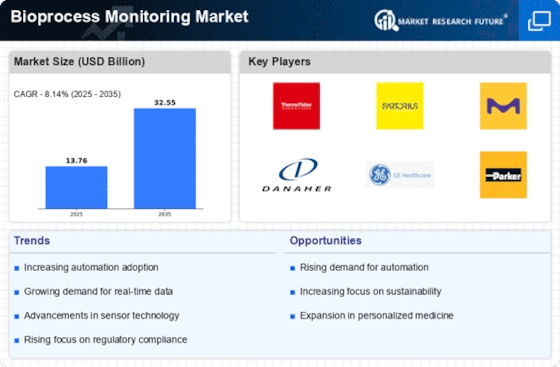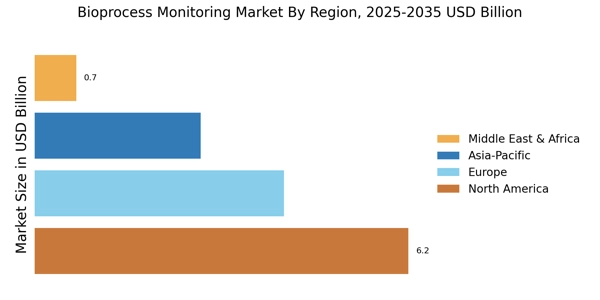Growing Focus on Process Optimization
The growing focus on process optimization is a significant driver of the Bioprocess Monitoring Market. As biopharmaceutical companies strive to enhance productivity and reduce costs, the need for effective monitoring solutions becomes increasingly apparent. Process optimization involves the continuous assessment and improvement of bioprocesses, which can be achieved through the implementation of advanced monitoring systems. These systems provide real-time data that allows for timely adjustments and improvements in production processes. The emphasis on efficiency is reflected in the market, where organizations are increasingly investing in bioprocess monitoring technologies to streamline operations. This trend is expected to contribute to the sustained growth of the Bioprocess Monitoring Market as companies seek to maximize their output while minimizing waste.
Increasing Demand for Biopharmaceuticals
The rising demand for biopharmaceuticals is a primary driver of the Bioprocess Monitoring Market. As the healthcare sector increasingly shifts towards biologics, the need for efficient and reliable bioprocess monitoring systems becomes paramount. According to recent data, the biopharmaceutical market is projected to reach approximately USD 500 billion by 2025. This growth necessitates advanced monitoring solutions to ensure product quality and compliance with regulatory standards. Consequently, companies are investing in sophisticated bioprocess monitoring technologies to enhance production efficiency and reduce costs. The integration of these systems not only supports the manufacturing of complex biologics but also aids in maintaining the integrity of the production process, thereby driving the Bioprocess Monitoring Market forward.
Regulatory Compliance and Quality Assurance
Regulatory compliance remains a critical driver for the Bioprocess Monitoring Market. As regulatory bodies impose stringent guidelines on biopharmaceutical production, companies are compelled to adopt advanced monitoring solutions to ensure adherence to these standards. The need for quality assurance in bioprocessing is underscored by the increasing scrutiny from regulatory agencies, which mandates comprehensive documentation and real-time monitoring of production processes. This trend is reflected in the market, where the demand for monitoring systems that facilitate compliance is expected to grow significantly. By implementing robust bioprocess monitoring technologies, organizations can not only meet regulatory requirements but also enhance product quality, thereby reinforcing their position in the competitive landscape of the Bioprocess Monitoring Market.
Rising Investment in Bioprocessing Facilities
Rising investment in bioprocessing facilities is a crucial driver for the Bioprocess Monitoring Market. As the demand for biopharmaceuticals continues to escalate, companies are expanding their production capabilities by investing in new bioprocessing facilities. This trend is accompanied by a corresponding need for advanced monitoring solutions to ensure the efficiency and reliability of these facilities. Recent estimates suggest that investments in bioprocessing infrastructure could exceed USD 100 billion by 2025. Such investments necessitate the integration of sophisticated bioprocess monitoring systems to maintain product quality and compliance with regulatory standards. As a result, the Bioprocess Monitoring Market is poised for growth, driven by the increasing establishment of state-of-the-art bioprocessing facilities.
Technological Advancements in Monitoring Solutions
Technological advancements play a pivotal role in shaping the Bioprocess Monitoring Market. Innovations such as real-time data analytics, advanced sensors, and automation technologies are revolutionizing the way bioprocesses are monitored. These advancements enable manufacturers to gain deeper insights into their production processes, leading to improved efficiency and reduced operational costs. The market for bioprocess monitoring solutions is projected to grow at a compound annual growth rate (CAGR) of over 10% in the coming years, driven by the adoption of these cutting-edge technologies. As companies seek to optimize their bioprocessing operations, the demand for sophisticated monitoring solutions that leverage the latest technological advancements is likely to surge, further propelling the Bioprocess Monitoring Market.

















